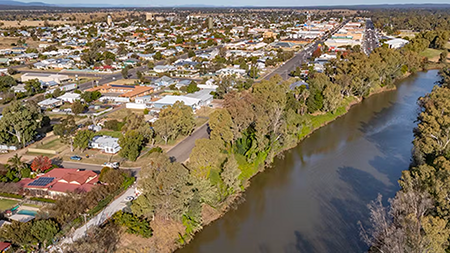Research Theme Leads: CSIRO and Deakin University
The aims of this theme are to:
- better understand how the changing climate will impact the Murray–Darling Basin
- identify options to adapt to change
- evaluate potential outcomes for Basin values.

The Murray–Darling Basin is a system facing profound future challenges to adapt to a changing climate. We will see the impacts either directly through the effects of reductions in rainfall on river flows, or indirectly through other risks such as the increased threat of bushfire.
Research questions
- Research Question 1. Which of the Basin’s economic, social, environmental, and cultural values are most vulnerable to the flow-related impacts of a changing climate?
- Research Question 2. How do other threats interact with a changing climate to affect vulnerabilities?
- Research Question 3. What is the best way to evaluate the effectiveness of water management arrangements to manage risks, including a changing climate?
- Research Question 4. What adaptation options can provide better protection to vulnerable values in the basin?
- Research Question 5. How do we undertake climate adaptation at regional scales that are most relevant to communities and environmental assets?
Projects in this theme
As the research questions above are interrelated, research is focussed around 4 areas, namely Foundational Science; Climate Adaptation Toolkit; Showcasing Adaptability and Synthesis and Integration. The research is synthesising current knowledge, delivering new modelling methods, and generating projections of plausible futures of water availability in the Basin.
Foundational Science has developed modelling methods to provide insights into the direct and indirect impacts of the changing climate on Basin water supply, demand and management. It also delivered new validated modelling methods for characterising the interactions between climate changes and indirect impacts on water demand and supply, enabling an evaluation of the relative impacts of each effect.
Showcasing Adaptability and Pilots has investigated adaptation to climate change, identified adaptation options and assessed their potential impacts on Basin values using case studies. From these case studies, a number were selected as adaptation investigations going forward. In addition, the impacts of water trading at a Basin-scale on climate adaptation are being investigated.
Synthesis and Implementation is synthesising outputs and learnings from the other research activities in order to maximise relevance to policy makers and practitioners. This project will produce syntheses of research across the climate adaptation theme, with a focus on Basin-wide recommendations.
Science Applications and Assessment Toolkit has developed a toolkit to enhance the ability to identify and assess the likely future impacts of climate change across social, environmental, cultural and economic values in the Basin. This involved identifying the values in the Basin and those which are most vulnerable to flow-related impacts of a changing climate. The toolkit will enable governments and water managers to select appropriate future climate scenarios, model flows associated with those scenarios and incorporate other relevant information to understand the response of identified values.
Why this work is important
This research is identifying adaptation options and evaluating their efficacy across economic, environmental, social and First Nations’ values. The research outcomes will support policy decisions and reduce the risk of outcomes that are more harmful than helpful.
Key outputs and outcomes for the climate adaptation theme
- An improved understanding of the water-related impacts of the future climate, both through direct (i.e. hydrological) and indirect (e.g. bushfires) changes.
- An enhanced ability to assess and compare the outcomes of adaptation options for catchment and Basin-scale water planning under a changing climate.
- Strategically selected case studies to identify and explore adaptation pathways at multiple scales and across values, including through community participation.
- Develop tools to enable the Australian Government to evaluate potential water management arrangements.
- Synthesis of climate adaptation research and capacity development.
Any enquiries can be sent to MDWERP@mdba.gov.au.
Last updated: 2 May 2025